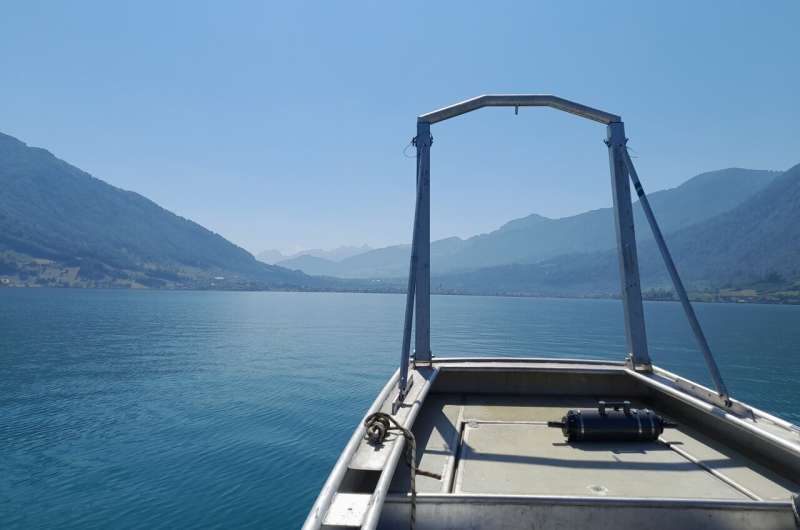This article has been reviewed according to Science X's editorial process and policies. Editors have highlighted the following attributes while ensuring the content's credibility:
fact-checked
peer-reviewed publication
trusted source
proofread
Bacteria in lakes fight climate change: The role of methanotrophs as biological methane filter

Methane is a potent greenhouse gas frequently produced in the sea and in fresh water. Lakes in particular release large quantities of this climate-killer. Fortunately, however, there are microorganisms that counteract this. They are able to utilize methane to grow and generate energy, thus preventing it from being released into the atmosphere. These microorganisms, known as methanotrophs, are therefore regarded as an important biological methane filter.
Methanotrophs comprise various groups of microorganisms, and many questions about their way of life have yet to be answered. A study by researchers from the Max Planck Institute for Marine Microbiology in Bremen, Germany, and the Swiss Eawag, which has now been published in the journal Nature Communications, shows the astonishing abilities of some of these organisms and their previously overlooked role in our climate.
Aerobic microorganisms in oxygen-free waters
For their study, the researchers Sina Schorn and Jana Milucka from the Max Planck Institute in Bremen traveled to Lake Zug in Switzerland. This lake is almost 200 meters deep and permanently oxygen-free from a depth of around 120 meters.
Nevertheless, the oxygen-free water contains so-called aerobic methane-oxidizing bacteria (MOB for short). These, as their name implies, are essentially dependent on oxygen. Whether and how they can break down methane in the oxygen-free water was unclear until now.
Milucka and Schorn's team therefore decided to take a closer look at the activity of these microorganisms. For their study, they used methane molecules (CH4) that were labeled with "heavy" carbon atoms (13C instead of 12C). These were added to natural lake water samples containing the inhabiting microorganisms.
Subsequently, the scientists followed the path of the heavy carbon in individual cells using special instruments (known as NanoSIMS). This allowed them to observe how the bacteria convert the methane into carbon dioxide, which is also a potent greenhouse gas but less climate-damaging than methane.
Part of the carbon was also incorporated directly into the bacterial cells. This revealed which cells in the bacterial community were active and which were not. Using modern methods such as metagenomics and metatranscriptomics, they also investigated which metabolic pathways the bacteria used.
Only one bacterial group is active without oxygen
"Our results show that aerobic MOB remain active also in oxygen-free water," says Schorn, who is now a researcher at the University of Gothenburg.
"However, this only applies to a certain group of MOB, easily recognizable by their distinctive rod-shaped cells. To our surprise, these cells were equally active under oxic and anoxic conditions, i.e. with and without oxygen. Thus, if we measure lower rates of methane oxidation in anoxic waters, it is probably because there are fewer of these special rod-shaped cells and not because the bacteria are less active."

Metabolic versatility against methane release
The Max Planck researchers encountered another surprise when they took a closer look at the metabolic capabilities of this group of bacteria.
"Based on the genes present, we were able to determine how the bacteria respond when oxygen becomes scarce," explains Milucka, head of the Greenhouse Gases Research Group at the Max Planck Institute in Bremen. "We found genes that are used for a special type of methane-based fermentation."
While this process had already been demonstrated for MOB cultures in the laboratory, it had not yet been studied in the environment. The researchers also discovered several genes for denitrification, which likely allow the bacteria to use nitrate instead of oxygen to generate energy.
The fermentation process, in particular, is interesting. "If the MOB perform fermentation, they likely release substances that other bacteria can use for growth. This means the carbon contained in the methane is retained in the lake for a longer period of time and does not reach the atmosphere. This represents a sink for methane carbon in anoxic environments that is typically not accounted for, which we will need to include in our future calculations," says Milucka.
Significant reduction of present and future methane emissions
In this study, the Bremen researchers explain who breaks down methane in oxygen-free habitats and how this degradation takes place. They show that methane-oxidizing bacteria are surprisingly important to keep the release of methane from these habitats to the atmosphere in check.
"Methane is a potent greenhouse gas that is responsible for about a third of the current global rise in temperature," says Schorn.
"Methane oxidation by microorganisms is the only biological sink for methane. Their activity is therefore crucial for controlling methane emissions into the atmosphere and thus for regulating the global climate. Given the current and predicted increase in anoxic conditions in temperate lakes, the importance of MOB for methane degradation in lakes is expected to grow. Our results suggest that MOB will make a significant contribution to greenhouse gas mitigation and carbon storage in the future."
More information: Sina Schorn et al, Persistent activity of aerobic methane-oxidizing bacteria in anoxic lake waters due to metabolic versatility, Nature Communications (2024). DOI: 10.1038/s41467-024-49602-5
Journal information: Nature Communications
Provided by Max Planck Society




















